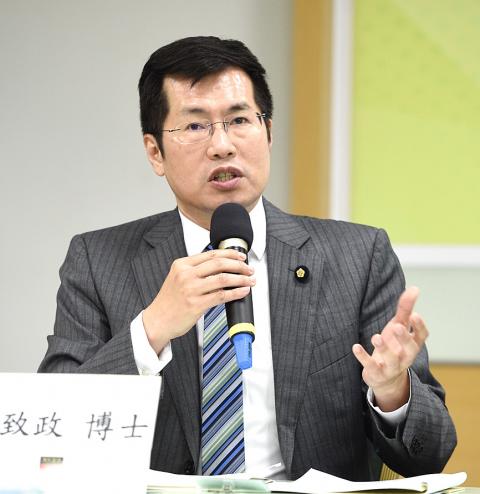The Democratic Progressive Party’s (DPP) losses in the nine-in-one elections on Saturday were mainly caused by widespread dissatisfaction with its domestic policies, DPP Legislator Lo Chih-cheng (羅致政) and academics said at a conference in Taipei yesterday.
The losses could be attributed to its problematic “middle-ground” approach to a wide range of issues from diplomacy and same-sex marriage to labor law reform, Lo told the conference.
For example, the DPP’s hesitation to follow through with legislation on same-sex marriage has drawn ire from young voters, who blame the party for “not being progressive enough,” while older voters oppose such legislation, he said.

Photo: George Tsorng, Taipei Times
“The party thought it was taking care of everyone, but ended up offending both sides,” he said.
While the DPP had expected to lose some races, the scope and extent of its losses were beyond what it had anticipated, Lo said.
“The DPP was defeated by itself, not the Chinese Nationalist Party (KMT). The KMT had no role in it. Kaohsiung mayor-elect Han Kuo-yu (韓國瑜) even had to avoid being associated with the KMT during campaigning. Our opponent was ourselves in the past two years and the progressive values we championed,” he said.
The DPP promoted the right reforms in wrong ways and at the wrong time, he said, adding that it had taken on too much at once.
The 10 referendums held alongside the elections also had a negative effect on the results, he said.
“The KMT used the referendums to mobilize its supporters. However, the ruling party demobilized its supporters by not expressing its stance on the referendums, as it was worried about maintaining government neutrality,” he said.
National Dong Hwa University professor Shih Cheng-feng (施正鋒) agreed said that numerous reforms in only two years had led to dissatisfaction among voters.
“The pension reforms were done poorly. The DPP clearly thought pensioners, who are typically KMT supporters, would not vote for them anyway,” Shih said.
National Chung Cheng University College of Social Sciences dean Soong Hseik-wen (宋學文) said reforms is necessary, but problems arose because they were promoted at the same time.
“Reforming the pension system, labor laws and energy laws made sense, and were even necessary, but dealing with them all at the same time caused problems. In addition, there were questions about how to promote them,” Soong said.
“The government did improve the economy, as data showed, but as with the reforms, the benefits from major policies were not immediately apparent,” he said. “There is usually a time lag,” he said.
However, the government should not radically adjust its policy direction just because of the election results, he said.

Taiwan is to commence mass production of the Tien Kung (天弓, “Sky Bow”) III, IV and V missiles by the second quarter of this year if the legislature approves the government’s NT$1.25 trillion (US$39.78 billion) special defense budget, an official said yesterday. Commenting on condition of anonymity, a defense official with knowledge of the matter said that the advanced systems are expected to provide crucial capabilities against ballistic and cruise missiles for the proposed “T-Dome,” an advanced, multi-layered air defense network. The Tien Kung III is an air defense missile with a maximum interception altitude of 35km. The Tien Kung IV and V

The disruption of 941 flights in and out of Taiwan due to China’s large-scale military exercises was no accident, but rather the result of a “quasi-blockade” used to simulate creating the air and sea routes needed for an amphibious landing, a military expert said. The disruptions occurred on Tuesday and lasted about 10 hours as China conducted live-fire drills in the Taiwan Strait. The Civil Aviation Administration (CAA) said the exercises affected 857 international flights and 84 domestic flights, affecting more than 100,000 travelers. Su Tzu-yun (蘇紫雲), a research fellow at the government-sponsored Institute for National Defense and Security Research, said the air

A strong continental cold air mass is to bring pollutants to Taiwan from tomorrow, the Ministry of Environment said today, as it issued an “orange” air quality alert for most of the country. All of Taiwan except for Hualien and Taitung counties is to be under an “orange” air quality alert tomorrow, indicating air quality that is unhealthy for sensitive groups. In China, areas from Shandong to Shanghai have been enveloped in haze since Saturday, the ministry said in a news release. Yesterday, hourly concentrations of PM2.5 in these areas ranged from 65 to 160 micrograms per cubic meter (mg/m³), and pollutants were

Taiwan’s armed forces have established response protocols for a wide range of sudden contingencies, including the “Wan Chun Plan” to protect the head of state, the Ministry of Defense (MND) said today. After US President Donald Trump on Saturday launched a series of airstrikes in Venezuela and kidnapped Venezuelan President Nicolas Maduro, concerns have been raised as to whether China would launch a similar “decapitation strike” on Taiwan. The armed forces regularly coordinate with relevant agencies and practice drills to ensure preparedness for a wide range of scenarios, Vice Minister of National Defense Hsu Szu-chien (徐斯儉) told reporters before a